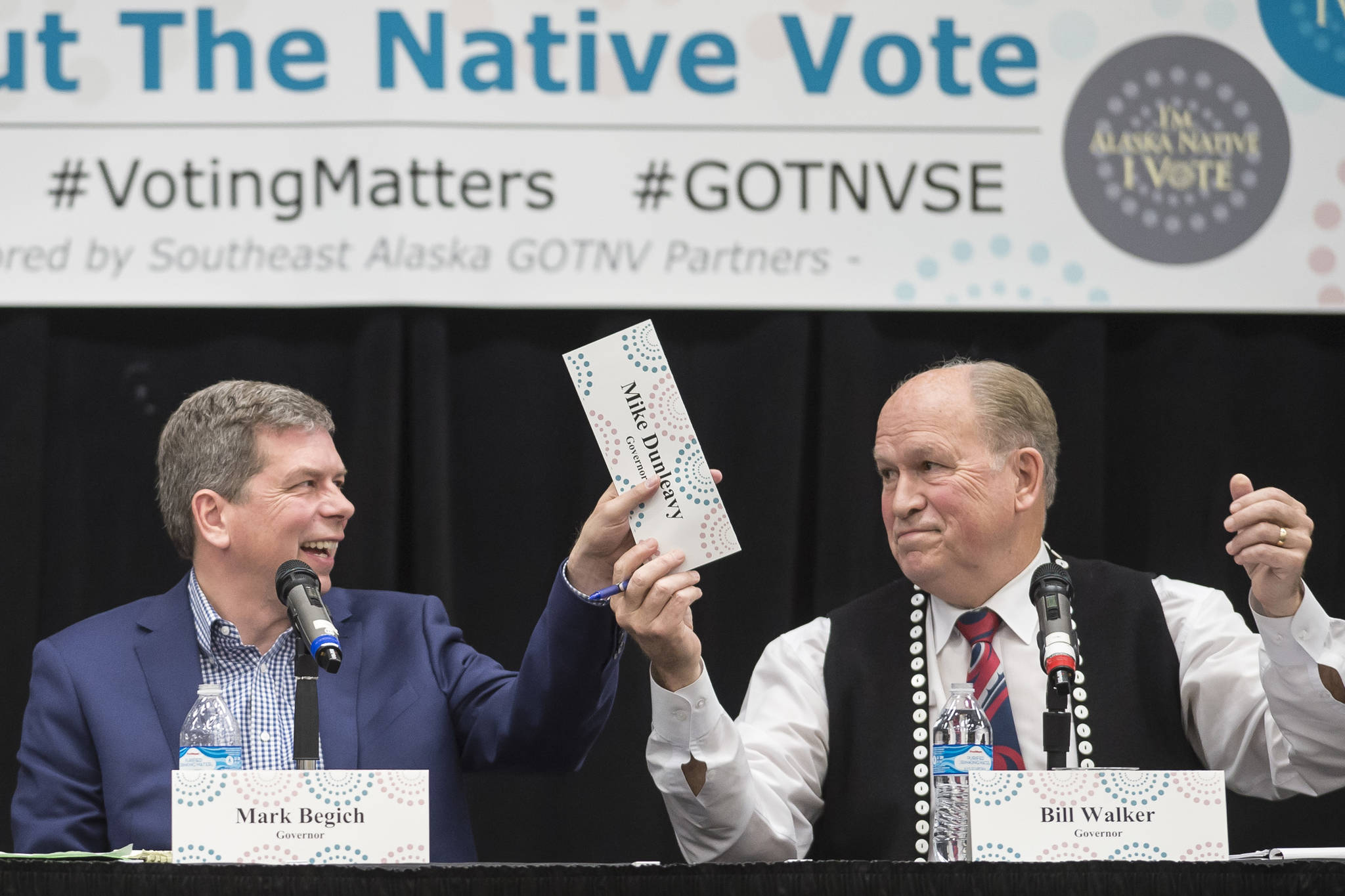Tuesday’s Get Out the Native Vote Gubernatorial Forum was almost more about who wasn’t there than it was about who was there.
Republican candidate Mike Dunleavy was absent from the forum, and Democratic candidate Mark Begich, Libertarian candidate Billy Toien and independent incumbent Bill Walker (who were all present) made sure that fact didn’t go unnoticed.
“It’s very disrespectful that neither he nor his lieutenant governor could do the courtesy of attending,” Walker said. “I’m embarrassed as an Alaskan that he’s running for this office and will not show up in this room.”
Daniel McDonald, a spokesperson for Dunleavy, said via phone Tuesday that Dunleavy had a series of meetings in the Anchorage area on Tuesday, including one with public safety employees. Dunleavy also had an event in the Mat-Su Valley on Tuesday night, McDonald said. Dunleavy plans on being at the Alaska Federation of Natives conference later this month, McDonald said.
Central Council Tlingit and Haida Indian Tribes of Alaska President Richard (Chalyee Éesh) Peterson made a brief comment prior to the forum beginning.
“If you want to represent us, you should be here to hear from us,” Peterson said.
Dunleavy’s absence from forums has been a theme during this election season, as multiple media outlets have documented that he’s missed more than the other candidates. The other candidates have made a habit of pointing it out, and Toien has even taken Dunleavy’s nametag and put a Toien for Governor bumper sticker over it at multiple forums, including Tuesday’s.
[Gubernatorial candidates talk budget, Juneau Access, ferry system]
Other than comments about Dunleavy, the candidates shared their thoughts on a variety of topics during the hour-and-a-half forum that was moderated by Rep. Sam Kito, D-Juneau. The three agreed that they opposed Judge Brett Kavanaugh’s appointment to the Supreme Court, but differed on some other topics.
Ballot Measure 1
Toien and Walker said they are not in favor of Ballot Measure 1, which is also known as Stand for Salmon. Begich spoke in favor of it.
The ballot proposal would increase protections for salmon habitats, but many developers in the state have said the provisions in the ballot measure are too restrictive and would make development much more difficult.
Begich said the proposal would give Alaskans more of a voice in the process of building near salmon streams. He also pointed out that opposition group Stand for Alaska has pumped a huge amount of money into fighting the ballot measure, and it’s made him suspicious.
“When I read all the advertisements, $10 million being spent to tell you why it’s a bad idea,” Begich said. “If it’s such a bad idea, I’m not sure they need $10 million, but they do, because maybe it’s not such a bad idea.”
Walker specifically said he’s worried about how the measure will affect rural communities, saying those towns need as much infrastructure as they can get and this measure could make development more difficult.
Toien said he was formerly in favor of it, but after reading it over and over, he believes the language is too broad and it should be rewritten.
“I am all for scrapping Prop 1 and then getting all the Alaskan people involved in ensuring there’s no outside interests in drafting a whole new Stand for Salmon that is balanced with resource development,” Toien said.
How to combat rising crime
Begich said that the top comment he gets from people on the campaign trail is concern about the rising crime rate in the state. The first item Begich talked about during Tuesday’s forum was that the state needs to do a better job recruiting and retaining law enforcement officers. He also said he wants to be tougher on drug dealers and invest in wellness or therapeutic courts to help those struggling with addiction.
Toien said he believes that if the state’s economy improves, some people will stop turning to crime. In reference to the opioid epidemic, he said organizations need to stop prescribing drugs such as Ritalin and Adderall to young people because that sets them on a path that could lead to harder drugs.
Walker pointed to his efforts in fighting the opioid crisis, including declaring the epidemic a public health disaster in February 2017 and coordinating state agencies to fight the spread of drugs in the state. He also talked about increasing penalties for drug trafficking and aiming to increase the number of beds for those in recovery across the state.
• Contact reporter Alex McCarthy at 523-2271 or amccarthy@juneauempire.com. Follow him on Twitter at @akmccarthy.

